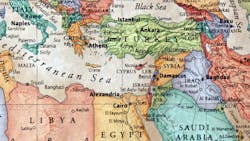Libya PM defends deal signed with Turkey over oil and gas exploration
Offshore staff
LIBYA — In Libya, Turkey signed a preliminary deal with Libya Prime Minister Abdul Hamid Dbeibeh's government of national unit (GNU) allowing for oil and gas exploration in a contested maritime zone, with an implicit agreement that Turkey will continue to support Dbeibah’s GNU militarily in Tripoli.
The agreement has escalated tensions in the Mediterranean with countries rejecting the deal as against international law. Greece has threatened to use force to defend its sovereignty against exploration in the contested region.
Libya’s eastern-based parliament has similarly rejected the deal claiming that Dbeibah does not have the mandate to sign international agreements. The deal is unlikely to be implemented in Eastern Libya as the East Libya coast is controlled by the parliament and General Haftar.
Tensions over Dbeibah’s signing of the deal with Turkey and his activation of the Higher Council of Energy, which offers him greater executive control over oil and gas decisions, have heightened the risk of protests and potential port closures in Eastern Libya.
He continued, "The Turkish-Libyan memorandum is based on bilateral agreements concluded before 2011. (...) It is our right to sign any agreement (...) of cooperation with other countries," Dbeibah said Wednesday evening in Tripoli, during a meeting with women's organizations.
The question of rights to Libya's vast hydrocarbon resources has become more urgent this year as global energy prices have soared.
"Global demand for gas has grown sharply since the Russian-Ukrainian war, and we will continue to explore for oil in our territorial waters in cooperation with other states," Dbeibah said in his speech.
10.10.2022

